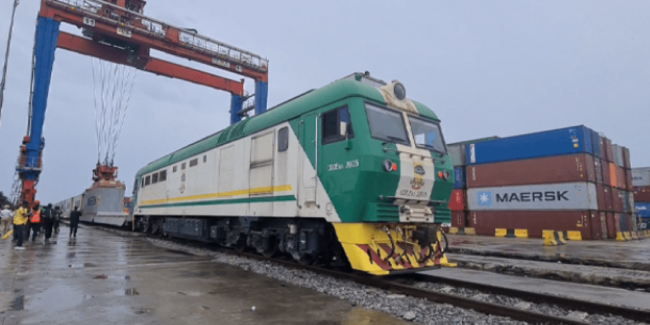Checks by the Nigerian Tribune have revealed that multiple handling charges have left the $1.5 billion Lagos-Ibadan cargo train stranded inside the Apapa Port for weeks.
When the Nigerian Tribune entered the Apapa port last week, the locomotive and wagons were seen parked inside the port terminal, with very few cargoes on it.
When our correspondent asked a port worker why the train has not left with the cargoes on it, the port worker, who pleaded anonymity, explained that the train has been there for weeks with those cargoes without leaving the port.
According to the port worker, “At times, the train spends weeks waiting to be fully loaded. The train doesn’t get fully loaded on time because of issues bordering around high cost of charges and lack of door-to-door delivery problems.
“When cargoes arrive, many importers opt for road haulage instead of rail haulage because of the high cost associated with rail haulage. And the train won’t leave except it gets a specific amount of cargo. So, at times, the Lagos-Ibadan cargo train spend weeks waiting for cargoes.
“If the prices can come further down, more cargo owners will use rail haulage and the train will get filled faster than the way it currently operates.”
When contacted, the Lagos District Manager of the Nigerian Railway Corporation (NRC), Engineer Augustine Arisa, debunked the claim that the Lagos-Ibadan cargo train is not getting filled on time due to high charges.
ALSO READ: After 72-hours of inactivity, Lagos-Ibadan cargo train stranded at Lagos Port
According to Engineer Arisa, “It’s not true that our charges are high. Our charges are the lowest. Our problem is the other charges that are levied on cargoes that want to use the rail haulage.
“Its true we don’t do door-to-door delivery services like the trucks do, and its also true that there is a specific number of containers that must be loaded on the train before it can move. We run on diesel, and cannot leave with maybe one or two or even five import units of containers. For us to balance our operating cost with what we earn, the train must have a specific number of containers loaded on it before it can move.
“However, we won’t force the cargo owners to use rail haulage. When the cargoes arrive, the owners have the right to choose which mode of exit they want their cargoes to use and exit the port. Many cargo owners prefer road haulage because it offers them door-to-door delivery options.
“Again, the issue of multiple handling charges is forcing others who want to use rail haulage to have a change of mind. Imagine if you had to pay rail handling charges after paying cargo handling charges. When the cargo arrives, the terminal operator loads the container on the truck or on the rail, depending on what the importer wants. If the cargo is loaded on a truck, the cargo owner only pays the cargo handling charges and settles the truck owner. However, if the cargo is to be loaded on a train, cargo owner pays the cargo handling charges and also pays the rail handling charges. After paying cargo handling charges and rail handling charge, the train takes the containers to a rail station close to the container destination, where it is then loaded on to a truck. Here, the cargo owner also pays for the loading of the container to a truck for onward delivery. So, due to these multiple handling charges, importers prefer trucks if the import unit of container is just one or two.
“It is importers that have large units of containers to move that make use of rail haulage more often. For an importer who wants to clear just one or two containers, such people use road haulage, and many of such cases abound at the port. So, our prices are not high. It is the door-to-door delivery issues and the multiple handling charges paid on cargoes that want to use the rail services that force many importers to prefer road haulage.”
READ ALSO: Seaport charges scaring importers away from $1.5bn Lagos-Ibadan cargo rail — NRC
Get real-time news updates from Tribune Online! Follow us on WhatsApp for breaking news, exclusive stories and interviews, and much more.
Join our WhatsApp Channel now
